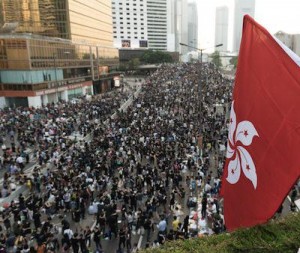Could mainland China not seek eventual convergence towards a democratic system, respectful of the full gamut of human rights? That actually is what the happenings in Hong Kong now are about.
The flag of Hong Kong suspended over protesters
The flag of Hong Kong suspended over protesters. Demotix/Xian Jun. All rights reserved.
If there is one place under Chinese sovereignty that enjoys freedom of assembly, freedom of the press (albeit eroding) and other attendant freedoms and where the residents zealously fight to safeguard them, it is Hong Kong.
Under the Sino-British Joint Declaration of 1984, China undertook to let Hong Kong keep its way of life unchanged for 50 years after the handover on 1 July 1997 under the “One Country, Two Systems” formula.
The Hong Kong Special Administrative Region (as it is known since 1997) retains an independent judiciary. Many judges from other common law jurisdictions serve in the city’s highest courts.
The Basic Law (Hong Kong’s post-handover constitutional document) stipulates that international human rights treaties and other labour rights instruments which were extended to Hong Kong, when it was under British sovereignty, would continue to apply.

